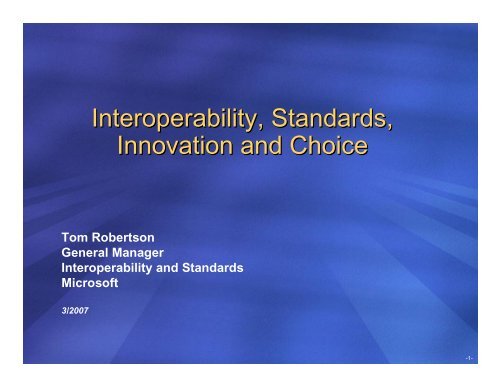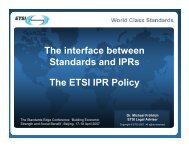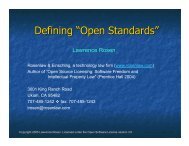Tom Robertson - The Bolin Group
Tom Robertson - The Bolin Group
Tom Robertson - The Bolin Group
Create successful ePaper yourself
Turn your PDF publications into a flip-book with our unique Google optimized e-Paper software.
Interoperability, Standards,<br />
Innovation and Choice<br />
<strong>Tom</strong> <strong>Robertson</strong><br />
General Manager<br />
Interoperability and Standards<br />
Microsoft<br />
3/2007<br />
-1-
Interoperability is a Market Necessity<br />
Governments<br />
• Consumers of ICT<br />
• Quality, value and reach in<br />
eGovernment<br />
• Promote innovation<br />
• Enable choice and competition<br />
Customers<br />
• Want heterogeneous ICT<br />
systems to work<br />
• Want choice among innovative<br />
solutions<br />
• Want value<br />
• As important as security &<br />
reliability<br />
ICT Industry<br />
• Multiplicity of business<br />
models<br />
• Meeting customer demands<br />
• Movement to the middle
Interoperability: Connecting people, data, and<br />
diverse systems<br />
Forms<br />
Organizational<br />
Semantic<br />
Technical<br />
(Legal)<br />
Achieving Interoperability<br />
• Products<br />
• Community<br />
• Technology Access<br />
• Standards<br />
Focus on addressing real customer needs and enabling innovation
Products<br />
Product interop features out of the box<br />
Documented protocols/data formats/APIs<br />
OSS products run on Windows<br />
SDKs, DDKs, connecters, samples…<br />
Microsoft<br />
Interoperability<br />
By Design<br />
Community<br />
Access<br />
>600 Community Dev Projects:<br />
Codeplex, GotDotNet, Sourceforge<br />
SugarCRM, JBoss, XenSource,<br />
Novell, Interop Vendor Alliance<br />
Interop Executive Customer Council<br />
Commercial Licensing<br />
Community Programs<br />
Open Specification Promise<br />
Standards<br />
SIGs, Consortia, National, Int’l<br />
Work in hundreds of SSOs<br />
Support thousands of standards
Do Innovation, Competition and Choice Matter in<br />
Standards-Based Interoperability?<br />
<strong>The</strong>y do.<br />
<strong>The</strong>re is innovation in standardized technologies.<br />
Standards can and do compete.<br />
<strong>The</strong>re is societal value in promoting innovation and choice.<br />
Interoperability is a dynamic exercise.<br />
Voluntary, consensus standards are developed in<br />
response to marketplace needs<br />
Optimal approach to standards-based interoperability<br />
Standards mandates can be appropriate in sub-set set of<br />
situations<br />
E.g., safety, security, limited public resources<br />
Tradeoffs may be limiting choice and innovation
Preserving Incentives to Innovate<br />
IP, licensing and standards-setting setting promote innovation<br />
Benefits consumers<br />
Measure of benefit: Static vs. Dynamic Efficiencies<br />
Static efficiency<br />
“Ex ante” can drive price of technology downwards and pressure<br />
IP holders to give up defensive rights<br />
Danger of creating innovation “dead zones”<br />
Dynamic efficiency<br />
Respects incentives to innovate<br />
Greater incentives to take risks and develop competing solutions<br />
Greater benefits to consumers<br />
Standards-setting setting IP policies should support dynamic<br />
efficiencies
Dynamic Nature of Innovation<br />
Where Innovation is Changing<br />
Small companies are a growing component of U.S. R&D<br />
investment<br />
Shorter innovation cycles in ICT industry<br />
“Open Innovation” – greater licensing in and out of intellectual<br />
property to increase business and societal value (Chesbrough)<br />
Ongoing Characteristics of Innovation<br />
Society benefits from innovation in all tech sectors<br />
Society benefits from innovation from all sources<br />
Standardization promotes “open innovation” by encouraging<br />
patent holders to share their IP with all implementers under RAND<br />
terms
Making Sense of IPR Policy Debates<br />
Sometimes difficult to understand the various<br />
positions of the participants<br />
Helpful to focus on the different ways business<br />
models drive revenue<br />
IP licensing company – reasonable return on R&D<br />
investment<br />
Product company – monetize IP through products;<br />
defensive approach in standards<br />
Services provider – use loss leader business model to<br />
drive monetization of services<br />
Consulting business model – transfer monetized value<br />
from product and/or licensed IP to consultant offerings<br />
All valid; none has dominance over others
Closing Points<br />
Interoperability is a market reality<br />
Address through multiple mechanisms<br />
Promote a dynamic approach to interoperability<br />
Ensure innovation, choice and competition<br />
IP is critical to the operation of system<br />
Accommodates multiple business models
Thank You<br />
tomrobe@microsoft.com<br />
www.Microsoft.com/interop









